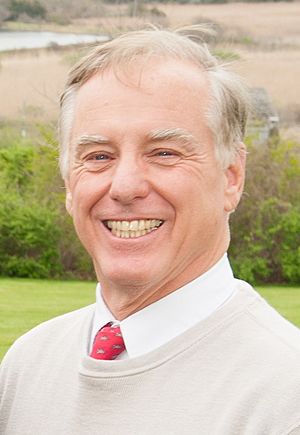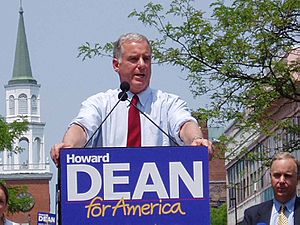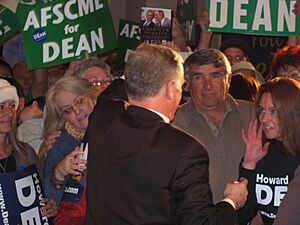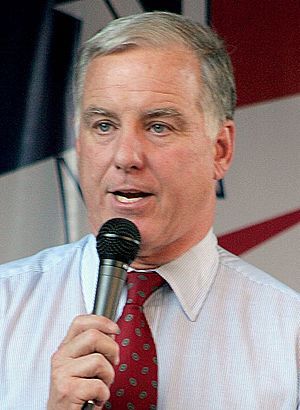Howard Dean facts for kids
Quick facts for kids
Howard Dean
|
|
|---|---|

Dean in 2016
|
|
| Chair of the Democratic National Committee | |
| In office February 12, 2005 – January 21, 2009 |
|
| Preceded by | Terry McAuliffe |
| Succeeded by | Tim Kaine |
| 79th Governor of Vermont | |
| In office August 13, 1991 – January 8, 2003 |
|
| Lieutenant | Barbara Snelling Doug Racine |
| Preceded by | Richard Snelling |
| Succeeded by | Jim Douglas |
| Chair of the National Governors Association | |
| In office July 19, 1994 – August 1, 1995 |
|
| Preceded by | Carroll A. Campbell Jr. |
| Succeeded by | Tommy Thompson |
| 77th Lieutenant Governor of Vermont | |
| In office January 3, 1987 – August 13, 1991 |
|
| Governor | Madeleine Kunin Richard Snelling |
| Preceded by | Peter Smith |
| Succeeded by | Barbara Snelling |
| Member of the Vermont House of Representatives from the Chittenden 7-4 district |
|
| In office 1983–1987 |
|
| Preceded by | constituency established |
| Succeeded by | Bennett Truman |
| Personal details | |
| Born |
Howard Brush Dean III
November 17, 1948 East Hampton, New York, U.S. |
| Political party | Democratic |
| Spouse | |
| Children | 2 |
| Education | Yale University (BA) Yeshiva University (MD) |
| Signature | |
Howard Brush Dean III (born November 17, 1948) is an American doctor and politician. He served as the 79th governor of Vermont from 1991 to 2003. He was also the chair of the Democratic National Committee (DNC) from 2005 to 2009.
Dean ran for the Democratic nomination for president in 2004. Although he did not win, his campaign was famous for using the internet to raise money and organize supporters. As head of the DNC, he created the "fifty-state strategy." This plan helped Democrats win elections in 2006 and 2008. After leaving politics, he became a political commentator and consultant.
Before politics, Dean was a medical doctor. He served in the Vermont House of Representatives and as Lieutenant Governor of Vermont while still practicing medicine. He became governor in 1991 after Governor Richard A. Snelling died. As governor, he helped Vermont pay off its debts and lowered taxes. He also expanded a health care program for children and pregnant women called "Dr. Dynasaur."
Contents
Early Life and Education
Howard Dean was born in East Hampton, New York. His father worked in finance, and his family was well-off. He is the oldest of four brothers. One of his brothers, Charles, was captured and killed while traveling in Southeast Asia in 1974. This event had a big impact on Dean's life.
Dean went to private schools, including St. George's School in Rhode Island. He graduated from Yale University in 1971 with a degree in political science. After college, he decided to become a doctor. He received his medical degree from the Albert Einstein College of Medicine in 1978. He then moved to Vermont to work as a doctor.
Vermont Political Career
Getting Started in Politics
In 1980, Dean led a local campaign to stop a big building project on Lake Champlain. He wanted a bike trail built there instead. His side won, and this success helped start his political career. He also volunteered for President Jimmy Carter's campaign that year.
In 1982, Dean was elected to the Vermont House of Representatives. He later became the Lieutenant Governor of Vermont in 1987. These were part-time jobs, so he could still work as a doctor with his wife, Judith Steinberg.
Governor of Vermont
On August 13, 1991, Governor Richard A. Snelling died suddenly. As lieutenant governor, Dean took over the office. He was later elected as governor five times. He served for a total of 11 years, longer than any other governor in Vermont's history.
As governor, Dean focused on the state's budget. He worked to pay off Vermont's debt and balanced the budget 11 times. He also lowered income taxes twice. He was known for being careful with money.
Dean also cared deeply about health care. He expanded the "Dr. Dynasaur" program, which provides health insurance for nearly all children and pregnant women in Vermont.
In 2000, he signed a law creating civil unions for same-sex couples. This was a new idea at the time and brought national attention to Vermont.
2004 Presidential Campaign
Dean decided to run for president in the 2004 election. At first, not many people thought he had a chance. But he gained attention for his strong speeches, especially his opposition to the 2003 invasion of Iraq. He said he represented "the Democratic wing of the Democratic Party."
A New Way to Campaign
Dean's campaign was famous for its use of the internet. He used websites like Meetup.com to organize supporters. People could donate small amounts of money online. This was called grassroots organizing, and it helped him raise more money than his rivals. His supporters were called "Deaniacs."
His campaign raised about $50 million in total. Most of it came from small donations online. This was a new and powerful way to fund a campaign. It showed that a candidate could succeed without relying only on large donors.
The "Dean Scream"
Despite his early success, Dean's campaign hit a major roadblock. On January 19, 2004, he came in third place in the 2004 Iowa Democratic caucuses. That night, he gave a passionate speech to his supporters to keep their spirits up.
At the end of the speech, he listed the states he planned to campaign in and shouted a loud "Yeah!" His voice was hoarse, and the sound was unusual. The media played this clip over and over, calling it the "Dean Scream." Many people believe this negative attention hurt his campaign badly.
After Iowa, Dean's campaign struggled. He eventually ended his run for president in February 2004. He later won the primary in his home state of Vermont.
Impact of the Campaign
Even though he lost, Dean's campaign changed politics. His use of the internet for fundraising and organizing became a model for future candidates, including Barack Obama in his successful 2008 campaign.
After his campaign, Dean started a group called Democracy for America. The group helps elect candidates who share his progressive ideas.
DNC Chairmanship
In February 2005, Howard Dean was elected chairman of the Democratic National Committee (DNC), the main organization for the Democratic Party.
The Fifty-State Strategy
As chairman, Dean created the "fifty-state strategy." Instead of focusing only on states that Democrats usually win, he wanted the party to compete everywhere. The DNC invested money and staff in all 50 states, even in places where Republicans were strong.
The goal was to build the party from the ground up. By supporting local candidates and organizers, Dean hoped to make Democrats more competitive across the country.
This strategy was a success. In the 2006 midterm elections, Democrats won control of both the House of Representatives and the Senate. In 2008, Barack Obama used the fifty-state strategy to help him win the presidency. He won in states like Indiana and North Carolina, which had not voted for a Democrat for president in many years.
Life After Politics
Dean left the DNC in 2009. He decided not to take a position in the Obama administration and entered the private sector. He has worked as a public speaker, a political commentator for MSNBC, and an advisor for a law firm.
He is also involved in education. He has been a fellow at Hofstra University and Yale University. He continues to speak about politics and health care policy.
Personal Life
In 1981, Dean married Dr. Judith Steinberg. They met in medical school and started a medical practice together in Shelburne, Vermont. They have two children, Anne and Paul.
Dean was raised as an Episcopalian but later joined a Congregational church. He has said he is more spiritual than religious. His wife is Jewish, and their children were raised in a secular home and identify as Jewish.
See also
 In Spanish: Howard Dean para niños
In Spanish: Howard Dean para niños
 | Percy Lavon Julian |
 | Katherine Johnson |
 | George Washington Carver |
 | Annie Easley |




